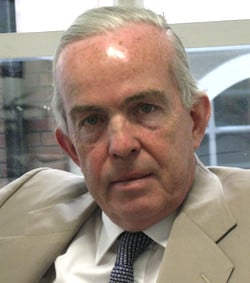A leading U.K. absolute return sector specialist has poured scorn on “people who pretend they have a crystal ball and can look at the economic situation and try and turn that into a return in a financial markets” and says that macroeconomic forecasting is “impossible”.
“Making market-directional bets are well-nigh impossible,” said Roderick Collins, who manages the Way Absolute Return Fund, a daily dealing U.K.-domiciled fund of hedge funds for Way Fund Managers, an investment management company.

“I have been working closely with two professors at the Cass Business School in London. The thesis is that macroeconomic forecasting is impossible and you see that whether you look at the performance of the OECD, IMF or Bank of England as they all get it wrong.
“That is the bad news, but the good news is it couldn’t matter less because there is no connection between macroeconomics and financial markets,” said Collins, who was previously a founding member of U.K. boutique manager Hasley Investment Management and who has also held senior positions at NM Rothschild, James Capel and Jardine Matheson.
“What we’ve done is to adopt a trend-following methodology which is quite interesting as it contradicts modern portfolio theory which says that financial markets are efficient when we actually believe that financial markets are inefficient and different people assimilate information at different speeds.
“So markets tend to trend so you are better off not looking through the windscreen but looking through the rear view mirror and seeing what has been going on for the last few months is going to continue.”
Collins, who admits to specializing in “quite esoteric areas” looks for absolute returns and favors assets with a low correlation to traditional asset classes.
“If you talk to most fund managers they will say ‘I think there is value in the U.S. or emerging markets’ but you will not get a comment like that from me as they are completely un-forecastable areas,” he said.
“I actually think the most interesting areas to look at are under-researched areas and an area that I am particularly familiar with is the variance in the absolute return sectors. Not just the hedge funds, but also infrastructure funds or funds that are invested in collateralized loan obligations and funds that are invested in syndicated bank credits.
“To an extraordinary extent the investment world is still equity-centric and looks at equities, bonds and a bit of property and the chance of one person being cleverer than another in that area is pretty low.”
In this search for increased yield, some investors are beginning to turn to alternative investments such as infrastructure finance. Infrastructure finance has, like many other sectors, suffered since the onset of the financial crisis with some funds being exposed to the volatility of overpriced and over-leveraged assets, but that may be beginning to change as governments in Europe begin to look at ways to kickstart their flagging economies and put in place projects that investors can make adequate risk-adjusted returns from.
“Investors are looking for increased yield, and to exploit new investment opportunities resulting from global de-leveraging,” said Matthew Botein, head of alternative investors at asset manager BlackRock. “Alternatives debt financing is a compelling proposition for investors.”
Collins at Way Group added: “Infrastructure funds can give you a nice yield of well over 5% in a range of infrastructure projects largely in private finance initiatives with government backing. They are quite interesting.
“I am interested in absolute returns and the ultimate benchmark is cash. That currently gives you a negative rate of real return, but so be it.”














